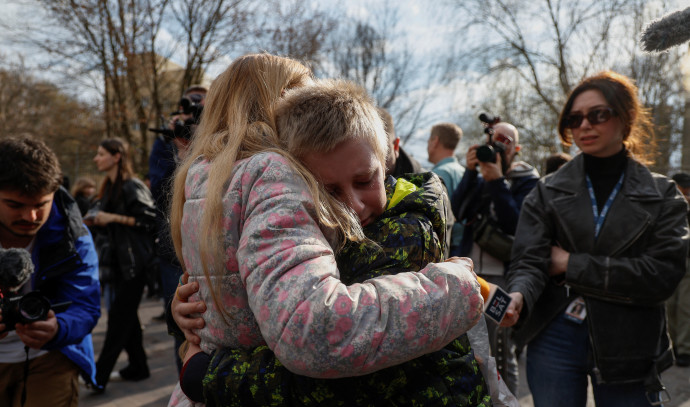The outbreak of Russia’s war of aggression against Ukraine almost two years ago has spread depression and a decline in people’s sense of well-being not only in the country that was attacked by Russia but also in the attacking country but throughout Europe and probably elsewhere around the world.
On February 24, 2022, Russia invaded Ukraine, thereby violating the country’s territorial sovereignty and escalating the Russo-Ukrainian war that began in 2014. Little is known about the psychological states surrounding the outbreak of war, particularly the mental well-being of individuals outside Ukraine.
A new study at Germany’s University of Münster just published in the prestigious journal Nature Communications under the title “Psychological well-being in Europe after the outbreak of war in Ukraine” said this mood decline was irrespective of age, gender, political views or any other attributes of the people questioned.
Waking up to smartphone notifications saying that the biggest country in the world had invaded a European country could have shocked people in similar ways, independent of their personalities or sociodemographic attributes. But in the weeks that followed, when the initial shock had subsided, the situation had a potentially less uniform effect on individuals, so that differences in threat sensitivity, tendency to contemplate, and other traits involving stability might have led to differences in participants’ propensities to experience a quick recovery in their well-being, they wrote.
After the immediate acute decline in global well-being levels on the day of the Russian invasion, recovery in well-being over the weeks following the outbreak of war was slow and connected with an individual’s personality, with individuals with low stability showing close to no recovery effects.
Is the war between Russia and Ukraine solely responsible for the mental health decline?
The invasion has had severe global consequences; for example, the war has resulted in Europe’s fastest-growing refugee crisis since World War II, global food shortages, and negative effects on the world economy. The UN Global Crisis Response Group estimated that 1.6 billion people in 94 countries are exposed to at least one dimension of the crisis. While effects such as the displacement of millions of civilians or disrupted supply chains are immediately visible, the psychological implications of the outbreak of war may be more difficult to trace, with potentially even more people worldwide experiencing psychological distress and impaired mental health during the war.
However, individual personality traits play a decisive role as regards the issue of recovering from the shock, said an international team of researchers headed by the German university’s psychologists Julian Scharbert and Prof. Mitja Back. The study was based on around 45,000 individual surveys taking in 1,300 people from 17 European countries, with over 50 researchers involved.
The study, carried out between late 2021 and summer 2022, made it possible to look at the course of the moods that the interviewees experienced day by day in the weeks surrounding the outbreak of war. “Normally, it isn’t possible to examine such impactful events in a precise timeframe and, at the same time, with such a wide geographical reach,” Back said. “The data are “unique.”
They found that the measurable collective mental stress is larger than after the nuclear catastrophe in Fukushima in 2011 and after the COVID-19 lockdowns in 2020. In the period surveyed, Europeans had a significantly lower sense of well-being than those in the rest of the world.
The survey gives no indication of any connection between levels of concern and active solidarity, for example through donations or taking part in demonstrations. A deterioration in the average level of mental health was observed on days on which the war had a particularly strong presence on social media.
The study focusing on mental health adds a further dimension to the debate on the humanitarian, political, and economic consequences of the war, they continued. While people’s well-being was stable before the war broke out, there was a collective downturn on the day of the Russian invasion. When they looked at the question of people’s recovery from this shock, however, the researchers came across systematic differences.
“In comparison with people who had a stable personality, those who had a more vulnerable and less stable personality hadn’t recovered a month after the beginning of the war,” explains Julian Scharbert, a doctoral student and lead author of the study.
“In addition to the obvious consequences of the war, such as the flow of refugees and disrupted supply chains, there are less-obvious dimensions – the impact of daily news and images on the psyche,” Scharbert suggested. “Our data indicate that political and social players should focus on mental health in times of crisis too, especially in the case of people who are in any case more vulnerable to stress.”




